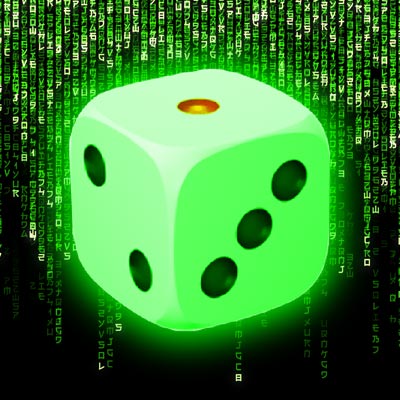Finally, I will just add that I don't think this idea of a simulation is new, except for the terminology makes it sound scifi.
I think that is an advantage - for it not to just be a new idea. I am a fan of this dream thought experiment - apparently it is related to Hinduism:
I wonder, I wonder, what you would do if you had the power to dream at night, any dream you wanted to dream. And you would of course be able to alter your time-sense and slip, say seventy-five years of subjective time into eight hours of sleep. You would, I suppose, start out by []

web.archive.org
I see each session of dreaming as being relevant to a simulation/game. It begins in God mode, etc.
It really is more of a vestigial artifact of religion. The way religions function is to offer something to people and get something back (usually money, sex or power). The thing offered is unreality--usually the fake existence of something beyond life such as an afterlife or an enlightened state. There's no waking up and taking off the VR headset in another dimension when we die. When we die, we die. There's no interesting cool Matrix. There's just life while we are here.
In that previous link you "wake up" after you die, also in this scenario:
If I still believed there was definitely no afterlife I'd be more likely to try and commit suicide again. The last time I was gassing myself in my car I thought I'd listen to the radio and heard Ben Lee's "Gamble Everything for Love" and the start of New Radicals' "You Get What You Give". After I heard the lyrics of "you've got a reason to live" from that song I stopped things but I was pretty disorientated. There are also quite a few other stories. I'm not saying there would definitely be an afterlife but I now believe I might be penalised in some way if I killed myself at this point in my life (and also I don't want to negatively impact my wife, etc).
Being "indistinguishable from reality" is from the player's point of view. Nick Bostrom also says that people's memories could be modified if they came across some problem with the simulation.
To go back to what you said earlier, even though it happens in Black Mirror a lot, you think that people will never hook up a mind or brain up to a simulation? Even in 10,000 years time?
On the other hand it's good that most people don't believe we're in a simulation because that would make things less immersive - that first link says:
And after you’ve done that for some time you’d think up a new wrinkle. To forget that you were dreaming so that you would think it was all for real. And to be anxious about it. Because it’d be so great when you wake up. And then you say well like children who dare each other on things, how far out could you get? Or could you take what dimension of being lost, of abandonment, of your power, what dimension of that could you stand you could ask yourself this because you know you would eventually wake up
I appreciate you sharing your perspective, and I want to respond to the philosophical points, but first, I must address the personal comments. The experience you described is a serious matter, and I strongly recommend you seek appropriate professional help. My primary concern is your well-being, and I encourage you to contact a crisis hotline or a mental health professional. As you know, there is also a Support Fireside forum here. I am intentionally not engaging with these personal details further, as they are entangled with your belief system and require professional support, not forum debate.
Regarding the issue of commonality between the
simulation hypothesis and
religious models, I believe you are focusing too narrowly on the surface-level comparison without examining the underlying function of religion.
You brought up the idea of forgetting you are dreaming to make it seem real--a point which perfectly highlights the structural similarity between the simulation idea and many religious doctrines. Let's use Mormonism as a concrete example, as it makes these simulation parallels particularly clear:
- Pre-existence: Prior to birth, your consciousness/soul exists in a separate, perfect realm (the Celestial Kingdom). (Analogy: The true person existing outside the simulation.)
- Life Selection: the almighty decides what life you will go into based on what you can handle in theory (Analogy: player profile)
- The Veil: Upon birth/conception, the soul passes through a "veil," causing it to forget all memory of its pre-earth existence. This forgetting is essential for the "test" to be valid. (Analogy: VR Headset)
- The Simulation: Existence on Earth is a limited, difficult trial period. (Analogy: limited-time game session)
- Resurrection/Judgment: Upon death, the veil is removed, and the person is judged on their performance, with their soul/conscious mind returning to the pre-existence, now able to remember everything. (Analogy: VR Headset is removed.)
Now, consider the rest of Christianity. Most major denominations posit that life on Earth is a crucial test of faith and/or morality, with an infinite reward or punishment in the afterlife. The mathematical logic here undermines the value of this life:
lim n--> infinity [ Time on Earth / Reward Time (After Life) ] = 0
If
n (the time in the afterlife) approaches infinity, the fraction of your existence spent on Earth approaches zero. This life is rendered practically meaningless relative to eternity.
The greatest logical flaw in a "test" religion—or a religion framed as a simulation—is the paradox of being
told it is a test in the middle of it.
- If the purpose is a pure test, then any hint of the rules, the stakes, or the existence of a reward system (i.e., the entire religious text) breaks the integrity of the test. An effective test requires true-to-life consequences.
- If the purpose is total immersion (as the quote you provided suggests), then the whole structure of religion—the promise of an afterlife—should be completely hidden until the simulation ends.
Instead, the existence of these promises suggests a different function, which brings me back to my original point: Control. Religions function as a system of social control because they successfully devalue the present life. If followers believe "this life doesn't matter" compared to the eternal reward, they are easily compelled to follow rules, make sacrifices, or even give up their lives (e.g., suicide bombers), all for the benefit of those in power. It is about
power, money, and/or sex for the religious leader/institution, not about a genuine simulation.


